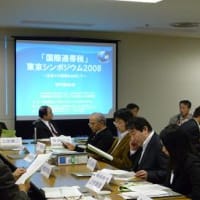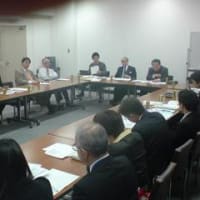
写真は9月18日行われたMDGs達成をめざす東京パレード
国際市民社会は11月11-12日に開催されるG20ソウル首脳会議に向け、「金融取引への課税に向けてG20は行動を」という共同署名を呼びかけています。署名の主旨は、保健と開発の資金を調達するため、短期的な金融投機を抑制するため、G20は金融取引税の導入に向けた具体的な進展で合意するよう要請するものです(以下の日本語文と英文を参照;10月28日現在の署名団体も載っています)。
賛同する団体は、団体名と活動基盤としている国名を書いて、11月4日の午前7時(ワシントン時間午後5時)までに、Amy Gray: amy@campaignforeducation.org に送ってください。
なお、リーマン・ショック以降の国際金融危機・世界同時不況で金融資産そのものが収縮したにもかかわらず、外国為替(通貨)取引は減少するどころか、次のように拡大しています。
●1営業日あたりの外国為替取引額
2007年3.324兆ドル、2009年3.637 兆ドル、2010年3.981兆ドル(2007年の20%増)
金融取引への課税に向けてG20は行動を
G20ソウル首脳会議に向けた国際市民社会の声明(仮訳)
我々、下に署名したXXカ国の市民社会組織は、来るソウル首脳会議において、G20各国首脳の皆様が国際的に調整された金融取引税の導入に向けた具体的な進展で合意するよう要請します。
我々の組織は、金融取引税が国内的、国際的な資金不足を補うのに必要な収入をあげるとともに、また、社会的にはほとんど価値を持たない一方で経済に高いリスクをもたらす短期的な金融投機を抑制する実際的な方法であることを長い間訴えてきました。金融取引税は、保健と開発の資金を調達する持続的な方法であり、切実に必要とされています。過去数ヶ月の間に、金融取引税導入の根拠は、時に予想外のところからのインプットにより、強められてきました。いくつかの進展が、金融取引税を議論の選択肢から実施へと移すための堅固な根拠を形成するのに貢献しています。
G20から委託されたIMFの調査が金融取引税の実現可能性を認める
2009年のピッツバーグ・サミットで、G20はIMFに対して、様々な金融セクターへの課税の選択肢についての報告書を用意するように求めました。2010年6月にIMFが提出した報告書は金融取引税以外の選択肢を支持するものではありましたが(74ページの報告書のうち、金融取引税に言及したのは3ページ)、金融取引税の実施上の実現可能性を確認しました。報告書に続いて発表されたテクニカルペーパーは、G20のほとんどの国が何らかの形の金融取引税を既に実施していることを指摘しており、税を最も効果的にするための設計方法についての有益な情報を提供しています。また、このテクニカルペーパーは、金融取引税が多額の税収を生み出すことも確認しています。
「革新的資金調達のためのリーディング・グループ」報告書が金融取引税の1種を推奨
2010年7月、国際的な金融・財政の専門家グループが、途上国の保健と開発に関する国際的誓約を達成するための資金源を目的とする金融取引課税の実現可能性を確認しました。この専門家グループは、ドイツ、英国、日本、フランス、ベルギー、韓国、ノルウェー、セネガル、ブラジル、スペイン、オーストリア、チリの12カ国の政府からなるグループからの委託を受け、金融取引税の実現可能性に関する調査を行いました。これらの国々は、(G20諸国の75%の国々を含む)60カ国から構成される革新的資金調達のためのリーディング・グループの一部です。報告書の中で、専門家グループは、銀行間の外国為替取引への課税が、連帯税を集める最も容易な方法であることを指摘しています。銀行間為替取引へのごく低い税率0.005%の課税で、年330億ドルが生み出されると専門家は計算しています。
欧州連合および国連・気候変動資金に関するハイレベル諮問グループが金融取引税を検討
今年初めに欧州議会が金融取引税への支持を表明して以降、欧州委員会は欧州レベルでの金融取引税導入の可能性を検討しています。欧州委員会の報告書は、税率や課税範囲によっては、金融取引税が年1兆ドルを生み出す可能性があることを言及しています。さらに、金融取引税は国連事務総長が召集した気候変動資金に関するハイレベル諮問グループによっても検討されています。このハイレベル諮問グループは、国家首脳、各国省庁や中央銀行の高官や金融の専門家によって構成されており、2010年10月末後半に、気候変動対策への資金調達の選択肢に関する報告書を公表すると見込まれています。
ますます差し迫まる 金融取引税の必要性
金融取引税は、グローバルな金融・経済危機によって引き続き発生しているコスト(受け入れ難いほど高い失業率を含む)に対応し、途上国の開発、保健、教育、気候変動対策に関する主要目標を達成するために必要とされる巨額の財源を生み出す数少ない選択肢の1つです。数千億ドルに達する未利用の財源を役立たせることができます。この財源は、国連ミレニアム開発目標(MDGs)を達成するためのODAに追加する資金源として必要です。IMFが提案する金融セクターへの課税案は、必要とされる資金量とは程遠いものがあります。同時に、金融市場の安定化を拡大する金融取引税の潜在的な恩恵は、金融市場をますます優勢になっている高頻度プログラム取引[訳注:非常に高速で高度なコンピュータプログラムを使って大容量の取引を行うことで、アルゴリズム取引とほぼ同義語]の危険性を世界が認識する中で、[資金源としての恩恵と]同様に重要です。金融取引税は、ごく低い税率でも、そのような投機活動のインセンティブを弱めることになるでしょう。
先日の国連MDGs総会の場で、フランスのニコラ・サルコジ大統領は、2011年のG20議長の任期中に金融取引税に関する国際合意を強く求めていくという歓迎すべき公約をしました。しかし、国際合意を遅らせる理由はありません。我々は、この重要な問題をソウルから実行に移すことをG20に求めます。
署名団体
International/Regional:
International Trade Union Confederation (ITUC)
Trade Union Advisory Committee to the OECD (TUAC)
European Federation of Public Service Unions (EPSU)
WWF International
Education International (EI)
Global Campaign for Education (GCE)
Feminist Task Force (GCAP)
International Union of Food, Agricultural, Hotel, Restaurant, Catering, Tobacco and Allied Workers’ Association (IUF)
ActionAid International (AAI)
Oxfam
Health Poverty Action
Greenpeace
Emmaus International
PLUS, Coalition Internationale Sida
Third World Network (TWN)
Global Call to Action Against Poverty (GCAP)
Federación Internacional Fe y Alegría
National:
AFL-CIO, US
WEED - Weltwirtschaft, Ökologie & Entwicklung, Germany
Make Poverty History, Canada
Institute for Policy Studies, Global Economy Project, US
Dutch Platform on Sustainable and Solidarity Economy, the Netherlands
Oikos Foundation (Dutch member, Tax Justice Network), the Netherlands
RESULTS, Canada
World Development Movement, UK
Both ENDS, the Netherlands
The National Union of Public and General Employees, Canada
War on Want, UK
CCFD-Terre Solidaire, Catholic Committee against Hunger and for Development, France
Norwegian Church Aid, Norway
CRBM, Italy
Service Employees International Union (SEIU), US
Australian Council of Trade Unions (ACTU), Australia
New Zealand Council of Trade Unions Te Kauae Kaimahi, New Zealand
The International HIV/AIDS Alliance, UK
African Initiatives, UK
Article 12 in Scotland, UK
University and College Union (UCU), UK
Grassroots International, US
Friends of the Earth, US
Bond, UK
Treatment Action Group (TAG), US
General Secretary National Union of Teachers. UK
United Methodist Church, General Board of Church and Society, US
Share The World’s Resources (STWR), UK
Public Citizen, US
Italian General Confederation of Labour, Italy
Ecologistas en Acción, Spain
Health GAP (Global Access Project), US
KAIROS Canadian Ecumenical Justice Initiatives, Canada
Victoria AIDS Resource & Community Service Society, Canada
The Canadian HIV/AIDS Legal Network, Canada
Nationwide Group Staff Union, UK
Friends of the Earth, Sierra Leone
Africa Europe Faith Justice Network, UK
TB Alert, UK
UNI-Korea Liaison Council, South Korea
CS de Comisiones Obreras (CS CCOO), Spain
Lokoj Institute, Bangladesh
Instituto del Tercer Mundo, Uruguay
Jubilee, Australia
IBON, Philippines
Trades Union Congress (TUC), UK
KRuHA-People's Coalition for the Right to Water, Indonesia
The National Union of Journalists, UK
Canadian Union of Public Employees (CUPE), Canada
Halifax Initiative, Canada
ABVV/FGTB, Belgium
Alliance Sud--the Swiss Coalition of Development Organisations, Switzerland
Institute for Agriculture and Trade Policy, US
Norwegian Forum for Environment and Development, Norway
Aktionsbündnis gegen AIDS, Germany
The International HIV/AIDS Alliance, UK
The Stop AIDS Alliance, Belgium
Spire, the Development Fund's Youth, Norway
Robin Hood Tax Campaign, UK
Stamp out Poverty, UK
ATTAC, France
Catholic Agency for Overseas Development (CAFOD), England and Wales
International HIV/AIDS Alliance, UK
CNCD-11.11.11, Belgium
World Federalist Movement, Canada
AITEC / IPAM, France
RESULTS, UK
Forum on Indonesian Development (INFID), Indonesia
Global Health Advocates (Avocats pour la Santé dans le monde), France
ATTAC, Denmark
Lunaria, Italy
ATTAC Québec, Canada
Red Mexicana de Acción frente al Libre Comercio (RMALC), Mexico
Alianza Mexicana por la Autodeterminación de los Pueblos (AMAP), Mexico
Bia´lii, Asesoría e Investigación, A.C, México
The Christian Socialist Movement (CSM), UK
Kepa, Service Centre for Development Cooperation, Finland
Fundación Primero de Mayo (First of May Foundation), Spain
FOCO -Foro Ciudadano de Participación por la Justicia y los Derechos Humanos, Argentina
Fair, Italy
Grupo Tacuba, A. C., Mexico
Consejo de Investigaciones e Información en Desarrollo CIID, Guatemala
Comisión Independiente de Derechos Humanos de Morelos, Mexico
Partido Revolucionario de los Trabajadores, Mexico
Pacto por la Soberania Alimentaria Energetica, los derechos de losTrabajadores y las Garantas Constitucionales en Morelos, Mexico
ATTAC, Spain
Movimiento Rural Cristiano de AC, Spain
Asociación de Defensa de la Vida, ADEVI, Perú
Veterinarians Without Borders (VSF), Spain
MUNDUBAT, Spain
Fiare Banca Ética de Sabadell, Spain
CNPL, Brazil
ATTAC, Norway
Otros Mundos AC - Amigos de le Tierra (Friends of the Earth), México
German Campaign "Tax Against Poverty", Germany
ATTAC, Germany
Global Alliance for Incinerator Alternatives (GAIA), Belgium
Confederación Revolucionaria de Obreros y Campesinos, (CROC), México
ASDE Scouts de España, Spain
Comité Nacional de la Confederación de Trabajadores, México
Indian National Trade Union Congress (INTUC), India
ATTAC- Hellas, Greece
Jubilee Debt Campaign, UK
Grupo de Tecnología Alternativa SC, Mexico
NKOTA-netzwerk, Germany
Mujer y Medio Ambiente AC, Mexico
Red de Genero y Medio Ambiente, Mexico
Jubilee USA Network, US
Civil Society Forum for Climate Change, Tanzania
Secretariado Social Mexicano, A.C., Mexico
The Federation of Independent Trade Unions of Russia, Russia
The African Campaign for Education for All (ANCEFA), Senegal
Secours Catholique / Caritas, France
Intersindical Valenciana, Spain
Ayuda en Accion, Spain
Campana Mundial para la Educacion/Global Campaign for Education, Spain
Altermond, Japan
To sign on to this letter, send the name of the organization and country in which it is based by 5PM Washington DC time on November 3rd to Amy Gray: amy@campaignforeducation.org
G-20: Take Action on Financial Transaction Taxes
International Civil Society Statement to the G-20 Leaders Summit in Seoul
We, the undersigned civil society organizations from 32 countries, urge G-20 leaders to make concrete progress towards the introduction of an internationally coordinated financial transactions tax (FTT) at the upcoming summit in Seoul.
Our organizations have long advocated that such taxes are a practical way to generate revenues needed to fill domestic and international financing gaps, discourage the type of short-term financial speculation that has little social value but poses high risks to the economy and serve as a desperately-needed and sustainable source of financing for health and development. In recent months, the case for an FTT has been strengthened with new inputs from sometimes unexpected sources. Several developments have contributed to building a solid foundation for going beyond discussion of options to implementation:
IMF research commissioned by the G-20 recognizes technical feasibility of FTTs
At the 2009 Summit in Pittsburgh, the G-20 charged the International Monetary Fund (IMF) with preparing a report on various financial sector taxation options. While the IMF report delivered in June 2010 favored an alternative approach (devoting only 3 of its 74 pages to FTTs), it did confirm the administrative feasibility of this option.(1) A follow-up IMF technical paper has pointed out that most G20 countries have already implemented some form of transaction tax, and offered useful information on how to design the taxes to make them most effective. The paper also confirmed that such taxes can generate substantial revenues.(2)
A report by the ‘Leading Group on Innovative Financing’ endorses one form of FTT
In July 2010, a group of international finance experts confirmed the feasibility of taxing financial transactions, with a view to financing international commitments for health and development made to developing countries. The experts had been commissioned to produce a feasibility study for a group of 12 governments -- Germany, UK, Japan, France, Belgium, Korea, Norway, Senegal, Brazil, Spain, Austria and Chile. These countries are part of the Leading Group on Innovative Financing for Development, comprised of 60 nations (including 75% of G20 member states). In their report, the experts point to foreign exchange transactions between banks as the easiest option for collecting a solidarity tax. They calculated that an extremely small tax of only 0.005% on such transactions would generate 33 billion USD per year.(3)
European Union and UN High-level Advisory Group on Climate Change Financing consider FTT
Meanwhile, the European Commission is considering the possibility of introducing an FTT at European level, following the support shown by the European Parliament earlier this year. A European Commission report notes that, depending on the rate and coverage, an FTT could potentially generate more than $1 trillion per year.(4) The FTT is also being addressed by a workstream of the High Level Advisory Group of the UN Secretary General on Climate Change Financing (AGF). The Group, made up of heads of state, high-level officials from ministries and central banks, and other finance experts, is expected to release a report on climate finance options in late October 2010.
The need for FTTs has grown more urgent
FTTs are one of the few available options that could generate the enormous financial resources required to pay for the continuing costs of the global financial and economic crisis, including reducing the unacceptably high rate of job loss, and to achieve key development, health, education and climate change objectives in developing countries. Several hundred billion dollars worth of untapped revenue could potentially be harnessed. This new financing is required in addition to official development assistance in order to meet the Millennium Development Goals. Alternative financial sector taxes as proposed by the IMF would fall far short of the volume required. At the same time, the potential benefit of FTTs to enhance market stability is of equal interest as the world has become more aware of the dangers posed by automated high-frequency trading that increasingly predominates in financial markets. Even extremely low transactions tax rates would reduce the incentive for such speculative activities.
At the recent UN Summit on Millennium Development Goals, French President Nicolas Sarkozy made a very welcome vow to press for an international agreement on FTTs during his term as G-20 chair in 2011. There is, however, no reason to delay. We call for G-20 action on this critical issue to begin in Seoul.
--------------------------------
(1) International Monetary Fund, “A Fair and Substantial Contribution by the Financial Sector: Final Report for the G20,” June 2010. http://www.imf.org/external/np/g20/pdf/062710b.pdf
(2) International Monetary Fund, “Taxing Financial Transactions: Issues and Evidence,” Chapter 8 of Financial Sector Taxation: The IMF's Report to the G-20 and Background Material, September 2010.
http://www.imf.org/external/np/seminars/eng/2010/paris/pdf/090110.pdf
(3) Report of the Committee of Experts to the Taskforce on International Financial Transactions and Development, “Globalizing Solidarity: The Case for Financial Levies,” July 16, 2010.
http://www.leadinggroup.org/article668.html
(4) Commission Staff Working Document, “Innovative financing at a global level,” Brussels, January 4, 2010. http://ec.europa.eu/economy_finance/articles/international/documents/innovative_financing_global_level_sec2010_409en.pdf
国際市民社会は11月11-12日に開催されるG20ソウル首脳会議に向け、「金融取引への課税に向けてG20は行動を」という共同署名を呼びかけています。署名の主旨は、保健と開発の資金を調達するため、短期的な金融投機を抑制するため、G20は金融取引税の導入に向けた具体的な進展で合意するよう要請するものです(以下の日本語文と英文を参照;10月28日現在の署名団体も載っています)。
賛同する団体は、団体名と活動基盤としている国名を書いて、11月4日の午前7時(ワシントン時間午後5時)までに、Amy Gray: amy@campaignforeducation.org に送ってください。
なお、リーマン・ショック以降の国際金融危機・世界同時不況で金融資産そのものが収縮したにもかかわらず、外国為替(通貨)取引は減少するどころか、次のように拡大しています。
●1営業日あたりの外国為替取引額
2007年3.324兆ドル、2009年3.637 兆ドル、2010年3.981兆ドル(2007年の20%増)
金融取引への課税に向けてG20は行動を
G20ソウル首脳会議に向けた国際市民社会の声明(仮訳)
我々、下に署名したXXカ国の市民社会組織は、来るソウル首脳会議において、G20各国首脳の皆様が国際的に調整された金融取引税の導入に向けた具体的な進展で合意するよう要請します。
我々の組織は、金融取引税が国内的、国際的な資金不足を補うのに必要な収入をあげるとともに、また、社会的にはほとんど価値を持たない一方で経済に高いリスクをもたらす短期的な金融投機を抑制する実際的な方法であることを長い間訴えてきました。金融取引税は、保健と開発の資金を調達する持続的な方法であり、切実に必要とされています。過去数ヶ月の間に、金融取引税導入の根拠は、時に予想外のところからのインプットにより、強められてきました。いくつかの進展が、金融取引税を議論の選択肢から実施へと移すための堅固な根拠を形成するのに貢献しています。
G20から委託されたIMFの調査が金融取引税の実現可能性を認める
2009年のピッツバーグ・サミットで、G20はIMFに対して、様々な金融セクターへの課税の選択肢についての報告書を用意するように求めました。2010年6月にIMFが提出した報告書は金融取引税以外の選択肢を支持するものではありましたが(74ページの報告書のうち、金融取引税に言及したのは3ページ)、金融取引税の実施上の実現可能性を確認しました。報告書に続いて発表されたテクニカルペーパーは、G20のほとんどの国が何らかの形の金融取引税を既に実施していることを指摘しており、税を最も効果的にするための設計方法についての有益な情報を提供しています。また、このテクニカルペーパーは、金融取引税が多額の税収を生み出すことも確認しています。
「革新的資金調達のためのリーディング・グループ」報告書が金融取引税の1種を推奨
2010年7月、国際的な金融・財政の専門家グループが、途上国の保健と開発に関する国際的誓約を達成するための資金源を目的とする金融取引課税の実現可能性を確認しました。この専門家グループは、ドイツ、英国、日本、フランス、ベルギー、韓国、ノルウェー、セネガル、ブラジル、スペイン、オーストリア、チリの12カ国の政府からなるグループからの委託を受け、金融取引税の実現可能性に関する調査を行いました。これらの国々は、(G20諸国の75%の国々を含む)60カ国から構成される革新的資金調達のためのリーディング・グループの一部です。報告書の中で、専門家グループは、銀行間の外国為替取引への課税が、連帯税を集める最も容易な方法であることを指摘しています。銀行間為替取引へのごく低い税率0.005%の課税で、年330億ドルが生み出されると専門家は計算しています。
欧州連合および国連・気候変動資金に関するハイレベル諮問グループが金融取引税を検討
今年初めに欧州議会が金融取引税への支持を表明して以降、欧州委員会は欧州レベルでの金融取引税導入の可能性を検討しています。欧州委員会の報告書は、税率や課税範囲によっては、金融取引税が年1兆ドルを生み出す可能性があることを言及しています。さらに、金融取引税は国連事務総長が召集した気候変動資金に関するハイレベル諮問グループによっても検討されています。このハイレベル諮問グループは、国家首脳、各国省庁や中央銀行の高官や金融の専門家によって構成されており、2010年10月末後半に、気候変動対策への資金調達の選択肢に関する報告書を公表すると見込まれています。
ますます差し迫まる 金融取引税の必要性
金融取引税は、グローバルな金融・経済危機によって引き続き発生しているコスト(受け入れ難いほど高い失業率を含む)に対応し、途上国の開発、保健、教育、気候変動対策に関する主要目標を達成するために必要とされる巨額の財源を生み出す数少ない選択肢の1つです。数千億ドルに達する未利用の財源を役立たせることができます。この財源は、国連ミレニアム開発目標(MDGs)を達成するためのODAに追加する資金源として必要です。IMFが提案する金融セクターへの課税案は、必要とされる資金量とは程遠いものがあります。同時に、金融市場の安定化を拡大する金融取引税の潜在的な恩恵は、金融市場をますます優勢になっている高頻度プログラム取引[訳注:非常に高速で高度なコンピュータプログラムを使って大容量の取引を行うことで、アルゴリズム取引とほぼ同義語]の危険性を世界が認識する中で、[資金源としての恩恵と]同様に重要です。金融取引税は、ごく低い税率でも、そのような投機活動のインセンティブを弱めることになるでしょう。
先日の国連MDGs総会の場で、フランスのニコラ・サルコジ大統領は、2011年のG20議長の任期中に金融取引税に関する国際合意を強く求めていくという歓迎すべき公約をしました。しかし、国際合意を遅らせる理由はありません。我々は、この重要な問題をソウルから実行に移すことをG20に求めます。
署名団体
International/Regional:
International Trade Union Confederation (ITUC)
Trade Union Advisory Committee to the OECD (TUAC)
European Federation of Public Service Unions (EPSU)
WWF International
Education International (EI)
Global Campaign for Education (GCE)
Feminist Task Force (GCAP)
International Union of Food, Agricultural, Hotel, Restaurant, Catering, Tobacco and Allied Workers’ Association (IUF)
ActionAid International (AAI)
Oxfam
Health Poverty Action
Greenpeace
Emmaus International
PLUS, Coalition Internationale Sida
Third World Network (TWN)
Global Call to Action Against Poverty (GCAP)
Federación Internacional Fe y Alegría
National:
AFL-CIO, US
WEED - Weltwirtschaft, Ökologie & Entwicklung, Germany
Make Poverty History, Canada
Institute for Policy Studies, Global Economy Project, US
Dutch Platform on Sustainable and Solidarity Economy, the Netherlands
Oikos Foundation (Dutch member, Tax Justice Network), the Netherlands
RESULTS, Canada
World Development Movement, UK
Both ENDS, the Netherlands
The National Union of Public and General Employees, Canada
War on Want, UK
CCFD-Terre Solidaire, Catholic Committee against Hunger and for Development, France
Norwegian Church Aid, Norway
CRBM, Italy
Service Employees International Union (SEIU), US
Australian Council of Trade Unions (ACTU), Australia
New Zealand Council of Trade Unions Te Kauae Kaimahi, New Zealand
The International HIV/AIDS Alliance, UK
African Initiatives, UK
Article 12 in Scotland, UK
University and College Union (UCU), UK
Grassroots International, US
Friends of the Earth, US
Bond, UK
Treatment Action Group (TAG), US
General Secretary National Union of Teachers. UK
United Methodist Church, General Board of Church and Society, US
Share The World’s Resources (STWR), UK
Public Citizen, US
Italian General Confederation of Labour, Italy
Ecologistas en Acción, Spain
Health GAP (Global Access Project), US
KAIROS Canadian Ecumenical Justice Initiatives, Canada
Victoria AIDS Resource & Community Service Society, Canada
The Canadian HIV/AIDS Legal Network, Canada
Nationwide Group Staff Union, UK
Friends of the Earth, Sierra Leone
Africa Europe Faith Justice Network, UK
TB Alert, UK
UNI-Korea Liaison Council, South Korea
CS de Comisiones Obreras (CS CCOO), Spain
Lokoj Institute, Bangladesh
Instituto del Tercer Mundo, Uruguay
Jubilee, Australia
IBON, Philippines
Trades Union Congress (TUC), UK
KRuHA-People's Coalition for the Right to Water, Indonesia
The National Union of Journalists, UK
Canadian Union of Public Employees (CUPE), Canada
Halifax Initiative, Canada
ABVV/FGTB, Belgium
Alliance Sud--the Swiss Coalition of Development Organisations, Switzerland
Institute for Agriculture and Trade Policy, US
Norwegian Forum for Environment and Development, Norway
Aktionsbündnis gegen AIDS, Germany
The International HIV/AIDS Alliance, UK
The Stop AIDS Alliance, Belgium
Spire, the Development Fund's Youth, Norway
Robin Hood Tax Campaign, UK
Stamp out Poverty, UK
ATTAC, France
Catholic Agency for Overseas Development (CAFOD), England and Wales
International HIV/AIDS Alliance, UK
CNCD-11.11.11, Belgium
World Federalist Movement, Canada
AITEC / IPAM, France
RESULTS, UK
Forum on Indonesian Development (INFID), Indonesia
Global Health Advocates (Avocats pour la Santé dans le monde), France
ATTAC, Denmark
Lunaria, Italy
ATTAC Québec, Canada
Red Mexicana de Acción frente al Libre Comercio (RMALC), Mexico
Alianza Mexicana por la Autodeterminación de los Pueblos (AMAP), Mexico
Bia´lii, Asesoría e Investigación, A.C, México
The Christian Socialist Movement (CSM), UK
Kepa, Service Centre for Development Cooperation, Finland
Fundación Primero de Mayo (First of May Foundation), Spain
FOCO -Foro Ciudadano de Participación por la Justicia y los Derechos Humanos, Argentina
Fair, Italy
Grupo Tacuba, A. C., Mexico
Consejo de Investigaciones e Información en Desarrollo CIID, Guatemala
Comisión Independiente de Derechos Humanos de Morelos, Mexico
Partido Revolucionario de los Trabajadores, Mexico
Pacto por la Soberania Alimentaria Energetica, los derechos de losTrabajadores y las Garantas Constitucionales en Morelos, Mexico
ATTAC, Spain
Movimiento Rural Cristiano de AC, Spain
Asociación de Defensa de la Vida, ADEVI, Perú
Veterinarians Without Borders (VSF), Spain
MUNDUBAT, Spain
Fiare Banca Ética de Sabadell, Spain
CNPL, Brazil
ATTAC, Norway
Otros Mundos AC - Amigos de le Tierra (Friends of the Earth), México
German Campaign "Tax Against Poverty", Germany
ATTAC, Germany
Global Alliance for Incinerator Alternatives (GAIA), Belgium
Confederación Revolucionaria de Obreros y Campesinos, (CROC), México
ASDE Scouts de España, Spain
Comité Nacional de la Confederación de Trabajadores, México
Indian National Trade Union Congress (INTUC), India
ATTAC- Hellas, Greece
Jubilee Debt Campaign, UK
Grupo de Tecnología Alternativa SC, Mexico
NKOTA-netzwerk, Germany
Mujer y Medio Ambiente AC, Mexico
Red de Genero y Medio Ambiente, Mexico
Jubilee USA Network, US
Civil Society Forum for Climate Change, Tanzania
Secretariado Social Mexicano, A.C., Mexico
The Federation of Independent Trade Unions of Russia, Russia
The African Campaign for Education for All (ANCEFA), Senegal
Secours Catholique / Caritas, France
Intersindical Valenciana, Spain
Ayuda en Accion, Spain
Campana Mundial para la Educacion/Global Campaign for Education, Spain
Altermond, Japan
To sign on to this letter, send the name of the organization and country in which it is based by 5PM Washington DC time on November 3rd to Amy Gray: amy@campaignforeducation.org
G-20: Take Action on Financial Transaction Taxes
International Civil Society Statement to the G-20 Leaders Summit in Seoul
We, the undersigned civil society organizations from 32 countries, urge G-20 leaders to make concrete progress towards the introduction of an internationally coordinated financial transactions tax (FTT) at the upcoming summit in Seoul.
Our organizations have long advocated that such taxes are a practical way to generate revenues needed to fill domestic and international financing gaps, discourage the type of short-term financial speculation that has little social value but poses high risks to the economy and serve as a desperately-needed and sustainable source of financing for health and development. In recent months, the case for an FTT has been strengthened with new inputs from sometimes unexpected sources. Several developments have contributed to building a solid foundation for going beyond discussion of options to implementation:
IMF research commissioned by the G-20 recognizes technical feasibility of FTTs
At the 2009 Summit in Pittsburgh, the G-20 charged the International Monetary Fund (IMF) with preparing a report on various financial sector taxation options. While the IMF report delivered in June 2010 favored an alternative approach (devoting only 3 of its 74 pages to FTTs), it did confirm the administrative feasibility of this option.(1) A follow-up IMF technical paper has pointed out that most G20 countries have already implemented some form of transaction tax, and offered useful information on how to design the taxes to make them most effective. The paper also confirmed that such taxes can generate substantial revenues.(2)
A report by the ‘Leading Group on Innovative Financing’ endorses one form of FTT
In July 2010, a group of international finance experts confirmed the feasibility of taxing financial transactions, with a view to financing international commitments for health and development made to developing countries. The experts had been commissioned to produce a feasibility study for a group of 12 governments -- Germany, UK, Japan, France, Belgium, Korea, Norway, Senegal, Brazil, Spain, Austria and Chile. These countries are part of the Leading Group on Innovative Financing for Development, comprised of 60 nations (including 75% of G20 member states). In their report, the experts point to foreign exchange transactions between banks as the easiest option for collecting a solidarity tax. They calculated that an extremely small tax of only 0.005% on such transactions would generate 33 billion USD per year.(3)
European Union and UN High-level Advisory Group on Climate Change Financing consider FTT
Meanwhile, the European Commission is considering the possibility of introducing an FTT at European level, following the support shown by the European Parliament earlier this year. A European Commission report notes that, depending on the rate and coverage, an FTT could potentially generate more than $1 trillion per year.(4) The FTT is also being addressed by a workstream of the High Level Advisory Group of the UN Secretary General on Climate Change Financing (AGF). The Group, made up of heads of state, high-level officials from ministries and central banks, and other finance experts, is expected to release a report on climate finance options in late October 2010.
The need for FTTs has grown more urgent
FTTs are one of the few available options that could generate the enormous financial resources required to pay for the continuing costs of the global financial and economic crisis, including reducing the unacceptably high rate of job loss, and to achieve key development, health, education and climate change objectives in developing countries. Several hundred billion dollars worth of untapped revenue could potentially be harnessed. This new financing is required in addition to official development assistance in order to meet the Millennium Development Goals. Alternative financial sector taxes as proposed by the IMF would fall far short of the volume required. At the same time, the potential benefit of FTTs to enhance market stability is of equal interest as the world has become more aware of the dangers posed by automated high-frequency trading that increasingly predominates in financial markets. Even extremely low transactions tax rates would reduce the incentive for such speculative activities.
At the recent UN Summit on Millennium Development Goals, French President Nicolas Sarkozy made a very welcome vow to press for an international agreement on FTTs during his term as G-20 chair in 2011. There is, however, no reason to delay. We call for G-20 action on this critical issue to begin in Seoul.
--------------------------------
(1) International Monetary Fund, “A Fair and Substantial Contribution by the Financial Sector: Final Report for the G20,” June 2010. http://www.imf.org/external/np/g20/pdf/062710b.pdf
(2) International Monetary Fund, “Taxing Financial Transactions: Issues and Evidence,” Chapter 8 of Financial Sector Taxation: The IMF's Report to the G-20 and Background Material, September 2010.
http://www.imf.org/external/np/seminars/eng/2010/paris/pdf/090110.pdf
(3) Report of the Committee of Experts to the Taskforce on International Financial Transactions and Development, “Globalizing Solidarity: The Case for Financial Levies,” July 16, 2010.
http://www.leadinggroup.org/article668.html
(4) Commission Staff Working Document, “Innovative financing at a global level,” Brussels, January 4, 2010. http://ec.europa.eu/economy_finance/articles/international/documents/innovative_financing_global_level_sec2010_409en.pdf



















